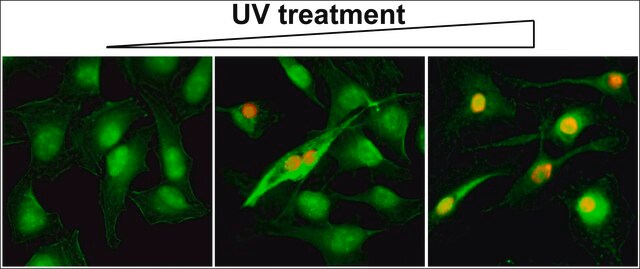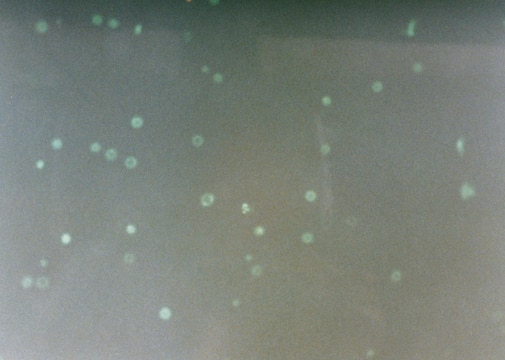APT242
MitoLight Mitochondrial Apoptosis Detection Kit
The MitoLight Apoptosis Detection Kit for flow cytometry utilizes a lipophilic cation, termed as MitoLight, as a mitochondrial activity marker.
Zaloguj sięWyświetlanie cen organizacyjnych i kontraktowych
About This Item
Kod UNSPSC:
12161503
eCl@ss:
32161000
NACRES:
NA.32
Polecane produkty
Poziom jakości
producent / nazwa handlowa
Chemicon®
MitoLight
metody
flow cytometry: suitable
metoda wykrywania
fluorometric
Warunki transportu
dry ice
Opis ogólny
Disruption of the mitochondrial transmembrane potential is one of the earliest intracellular events that occur following induction of apoptosis. The MitoLight Apoptosis Detection Kit utilizes a lipophilic cation, termed as MitoLight, as a mitochondrial activity marker. MitoLight is a mitochondrial dye that stains mitochondria in living cells in a membrane potential-dependent fashion. The monomer is in equilibrium with so-called J-aggregates, which are favored at higher dye concentration or higher mitochondrial membrane potential.
MitoLight partitions differently in healthy cells than in apoptotic cells. Therefore, it has been possible to use a fluorescence ratioing technique to study mitochondrial membrane potentials. In healthy cells, the dye accumulates and aggregates in the mitochondria, giving off a bright red fluorescence (λem = 585-590 nm). In apoptotic cells with altered mitochondrial membrane potential, the dye in its monomeric form stays in the cytoplasm, fluorescing green (λem = 527-530 nm), providing a ready discrimination between apoptotic and nonapoptotic cells. The fluorescence can be observed by fluorescence microscopy using a band-pass filter (detects FITC and rhodamine) or analyzed by flow cytometry using FITC channel for green monomers (Ex/Em = 488/530) and PI channel for red aggregates (Ex/Em = 488/585).
MitoLight partitions differently in healthy cells than in apoptotic cells. Therefore, it has been possible to use a fluorescence ratioing technique to study mitochondrial membrane potentials. In healthy cells, the dye accumulates and aggregates in the mitochondria, giving off a bright red fluorescence (λem = 585-590 nm). In apoptotic cells with altered mitochondrial membrane potential, the dye in its monomeric form stays in the cytoplasm, fluorescing green (λem = 527-530 nm), providing a ready discrimination between apoptotic and nonapoptotic cells. The fluorescence can be observed by fluorescence microscopy using a band-pass filter (detects FITC and rhodamine) or analyzed by flow cytometry using FITC channel for green monomers (Ex/Em = 488/530) and PI channel for red aggregates (Ex/Em = 488/585).
Zastosowanie
Research Category
Apoptosis & Cancer
Apoptosis & Cancer
The MitoLight Apoptosis Detection Kit for flow cytometry utilizes a lipophilic cation, termed as MitoLight, as a mitochondrial activity marker.
Komponenty
MitoLight (Part No. 71616): 100 μL in DMSO.
10X Incubation Buffer (Part No. 71614): 20 mL.
10X Incubation Buffer (Part No. 71614): 20 mL.
Przechowywanie i stabilność
Store kit materials at -20°C up to their expiration date. After thawing, unused kit components can be refrozen. For best results, aliquot the MitoLight reagent into separate vials to avoid repeated freeze/thaw cycles.
PROTECT REAGENTS FROM LIGHT.
PROTECT REAGENTS FROM LIGHT.
Informacje prawne
CHEMICON is a registered trademark of Merck KGaA, Darmstadt, Germany
Oświadczenie o zrzeczeniu się odpowiedzialności
Unless otherwise stated in our catalog or other company documentation accompanying the product(s), our products are intended for research use only and are not to be used for any other purpose, which includes but is not limited to, unauthorized commercial uses, in vitro diagnostic uses, ex vivo or in vivo therapeutic uses or any type of consumption or application to humans or animals.
Ta strona może zawierać tekst przetłumaczony maszynowo.
Kod klasy składowania
10 - Combustible liquids
Certyfikaty analizy (CoA)
Poszukaj Certyfikaty analizy (CoA), wpisując numer partii/serii produktów. Numery serii i partii można znaleźć na etykiecie produktu po słowach „seria” lub „partia”.
Masz już ten produkt?
Dokumenty związane z niedawno zakupionymi produktami zostały zamieszczone w Bibliotece dokumentów.
Klienci oglądali również te produkty
Nasz zespół naukowców ma doświadczenie we wszystkich obszarach badań, w tym w naukach przyrodniczych, materiałoznawstwie, syntezie chemicznej, chromatografii, analityce i wielu innych dziedzinach.
Skontaktuj się z zespołem ds. pomocy technicznej
